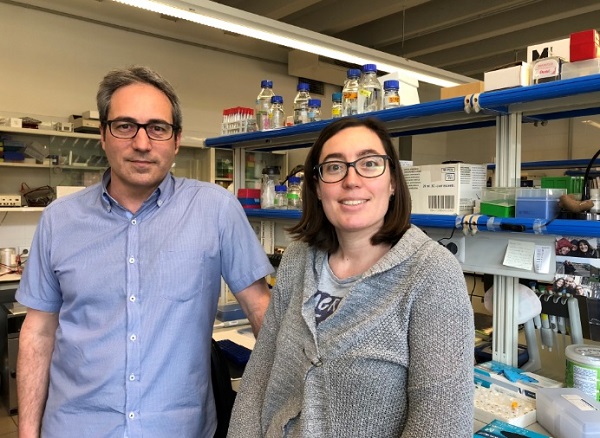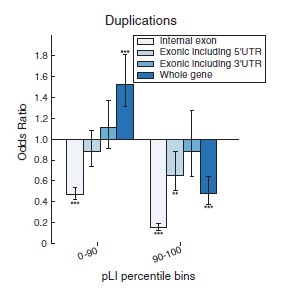Researchers find rare genetic variants associated with paternally-inherited autism
Researchers find rare genetic variants associated with paternally-inherited autism
The study published in the journal Science is a step forward to study the genetic landscape of autism. Deletions, tandem duplication, inversions, and complex structural changes in genes are some of the structural changes related to the disease.

An international study carried out with 2,600 families reveals the impact of paternally-inherited rare genetic variants in autism, a polygenic disease which is hard to diagnose and to treat. The study, published in the journal Science, identifies several genetic variants related to autism, which are caused by deletions, tandem duplications, inversions, complex structural changes and several kinds of mobile genetic elements that shape a new genetic landscape for the autistic spectrum.
Thirty institutions from around the world take part in the study. Among them are the experts Bru Cormand, from the Institute of Biomedicine of the UB (IBUB), the Research Institute Sant Joan de Déu (IRSJD) and the Rare Diseases Networking Biomedical Research Center (CIBERER); Claudio Toma, from the Faculty of Biology of the UB; Roser Corominas, from Pompeu Fabra University, CIBERER and IMIM; Isabel Rueda, from the University Hospital Sant Joan de Déu; Amaia Hervás and Silvia Guijarro, from the University Hospital MútuaTerrassa, and M. Jesús Arranz, director of the research laboratory of MútuaTerrassa’s Fundació i Docència Foundation.
Craig Venter, an internationally distinguished researcher regarding human genome decoding, takes part in the new study, led by the expert Jonathan Sebat (University of California San Diego, United States), which is a step forward to know more about the complex genetic and molecular map of autism.
What does genetic say on the origins of autism?
According to the World Health Organization, one out of 160 children suffers from autism spectrum disorder (ASD), a multifactor pathology that alters communicative skills, social behaviour and language. People with this disease need assistance with the collaboration of the medical, education and social sectors. The clinical and etiological diversities associated with ASD pathologies –with different levels for each case- complicates the diagnostic criteria and clinical and assistance trials.
The causes for autism are still unknown. However, progresses in molecular biology and genomics point out that it has a complex genetic base. A diagnose in time is determining to start psychosocial interventions from the beginning of childhood and boost the progress and wellbeing of the affected ones.
Rare variants in a polygenic-based complex disease
According to the researcher Bru Cormand, head of the Neurogenetics Research Group at the Faculty of Biology of the UB and member of CIBERER, IBUB and IRSJD, “the new study is different from the research that has been conducted so far on the genetics of autism for two reasons: first, it explores the impact of the inherited rare genetic variants in autism, while many previous studies worked on de novo rare variants, i.e. mutations that come up during gamete formation but which are not present in the parents”.
“Moreover, the study is focused on structural alterations, that is, the changes in DNA long segments – deletions, duplications, insertions or inversions- while previous research analysed changes in a single nucleotide. These genetic variants are especially relevant due their potential impact on the regulation of the gene expression. There are studies with a higher number of patients but the new one covers an innovative perspective of the genetics of autism that required a huge effort when it comes to the biocomputer data analysis”.
Thousand families participated in the study: more than 3,000 people (affected people, healthy siblings and parents) and 2,000 more in the replica study. A third part of the families in the initial study took part in it for the first time and they come from the REACH cohort, which includes affected people from the University Hospital MútuaTerrassa, the University Hospital Sant Joan de Déu and clinical centers from California (United States). The other participants are part of the platform ‘The Simons Simplex Collection’ (SSC), an initiative by Foundation Autism Research Initiative (SFARI), created in the United States to promote research on genetics related to autism.
 The human genome: in search of the genetic landscape of the autistic spectrum
The human genome: in search of the genetic landscape of the autistic spectrum
In this study, the use of the full genome sequencing technique (WGS) has enabled researchers to identify several structural variants that were not detected with other techniques –CGH/SNPs arrays or whole-exome sequencing, WES)- due its small size or their location in non-coding regions.
One of the most significant contributions of the study is the classification of functional regions that are relevant to the genome depending on their intolerance towards presenting structural variants. Researchers focused on the regions that are involved in the genome expression regulation of the patients (transcription start, 3’UTR and fetal brain promoters) in genes that are intolerant to structural variants (and therefore, consequences are adverse).
According to the researcher Roser Corominas (UPF-CIBERER-IMIM), “one of the main challenges with the WGS technique is the interpretation of the identified variants. With WGS, we can sequence the whole genome but the functional impact of most identified alterations is still quite unknown so far. In order to solve these doubts, fine biocomputer tools ─some are used in this study─ and big-scale functional analyses are essential”.
According to the experts, if we rule out the known pathogenic structural variants ─which account for the 1.9 % of ASD cases─ the study reveals that the identified structural variants contribute by 11 % of the cases, an important figure. Out of these, half are de novo mutations that affect specific genes and the other half are inherited mutations that alter regulating elements or genes. If we add specific rare mutations to these figures and the known frequent variations, we get closer to creating the complete genetic landscape of the autistic spectrum, although there is a lot to be studied yet”.
Paternally or maternally inherited? A complex puzzle
The study shows there is a higher paternal inheritance of structural variants in gene expression regulating regions than tolerant variations. This result –one of the most surprising ones in the study- is contrary to what was found on mutation transmission originated by truncated proteins, a process related to maternal prevalence. The general idea that the transmitted genetic risk would come mainly from the mothers is based in its lower vulnerability. According to the new study, the effects of the paternal/maternal inheritance in the genetic risks of autism are more complex than it was thought so far.
Progresses in biomedical research to find therapeutic targets
According to the doctors Amaia Hervàs, coordinator of clinical teams in the area of Barcelona in this study, and M Jesús Arranz, coordinator of genetic works in MútuaTerrassa, “the results of this study help us to better understand the genetic mechanisms that contribute to the appearance of inherited autism and which will ease the development of future tools for pharmaceutical treatments”.
The efforts to define the behaviours of the genetic landscape in autism in detail gave way to a list of altered genes in patients. The new findings, which provide hints on the important brain functions that are altered, reveal those elements of the genome that could be targets to develop future therapies for the patients. According to the authors, “the study reveals that many detected alterations in patients have an impact on elements that regulate the gene expression. Although we are far from therapeutic applications, this could open new windows to get clinical improvements in patients if we can modify –increase or reduce- the expression of certain genes”.
Reference article:
William M. Brandler et al. Paternally inherited cis-regulatory structural variants are associated with autism. Science, April 2018. DOI: 10.1126/science.aan2261
